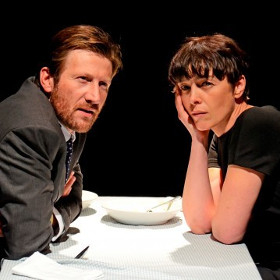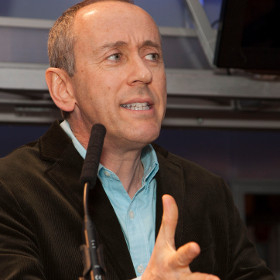Michael Coveney: Critical news at St James Theatre and new hope for LAMDA
Our chief critic reflects on the resignation of the artistic director of the new St James Theatre, and attends a LAMDA fundraiser at the National Theatre

The departure of David Gilmore from the new St James Theatre he launched nearly three years ago is a great shame – he's an artistic director of taste, passion and good track record – but it's also an admission that running a theatre, and programming it, is very hard work in highly competitive times; talent is always at a premium, and the best stuff, whoever you are, and wherever, will always be going elsewhere in London if you start up a new commercial enterprise.
It also puts paid to the absurd notion that there are lots of good plays, for instance, waiting to be produced and being kept out by musicals in the West End, an old argument aired for the umpteenth time on BBC Radio 4's lunchtime news programme the other day; the new plays audience, such as it is, goes anywhere but the West End, and is very well catered for at the NT, the Royal Court, the Arcola, the Almeida, the Donmar, BAC Theatre, 503… you name it, they're catering; you want new plays? No problem.
And the West End will always, quite rightly, cream off the best of it to everyone's commercial advantage, eg The Curious Incident of the Dog in the Night-Time (a huge West End hit) and Chimerica (no less deserving, but a comparative flop). Incidentally, I might observe that the obvious audience for Arturo Ui is not likely to make its way to the Duchess, despite the seductive enchantments of producer Nica Burns; this is a £10 show for a £10 student audience, if ever there was one, starring the brilliant Henry Goodman who, alas, is not really a box office draw.
This pressure of star names and audience enthusiasm has been put into a new perspective by reports of Betrayal on Broadway starring Daniel Craig, aka James Bond these days, but a truly outstanding stage actor, his wife Rachel Weisz and Rafe Spall, putting out tickets, through their producers, for a going price of $500. Good for them. And it all no doubt makes good economic sense. But what does it do the audience? It changes them into investors, high-end tourists, co-conspirators in an unhealthily elitist event.
Theatre is always best coming out of a company, or a set of artistic principles at least. Musical theatre is perhaps a triumphant exception to this rule, but only because musical theatre is the most difficult and most complicated of all art forms and will only prosper when the most talented people are all operating equally at the top of their game; and at the right time!
The same is true to a lesser extent, of so-called serious theatre. I've seen Trevor Nunn's production of Ingmar Bergman's Scenes From a Marriage twice now – at the premiere of Joanna Murray-Smith's clunky adaptation in Coventry, starring Iain Glen and Imogen Stubbs a few years ago, and at the St James in September (it's still on there, amazingly) – and I simply don't understand how such brilliant performances by Olivia Williams and Mark Bazeley can survive the endless scene changes, moving furniture and deliberately awful home videos that intersect them.
As one of the perceptive young reviewers in the St James' own young critics competition – which I've been judging with Lyn Gardner and the outgoing Gilmore – remarked, did families ever wash their cars together, and if they did, do they now?
There's no way this stage version comes close to the emotional intensity of the Bergman television film, but I loved the way our young critics came close to dealing with the sexual and marital issues in the piece, even though none of them, as far as I could see, had yet embarked on this fearsome and intimidating journey in their own lives.
The most encouraging thing was that all four of the finalists really could write, the first and most important prerogative in a critic. They'd all spun out a thousand interesting words on the production, full of descriptive analysis, sad reflections on marriage as an institution, and the actors' "peculiar concoction of sexual chemistry and loathing."

© Dan Wooller
That last phrase was our winner's, Nicholas Hyder, a 20 year-old student at Royal Holloway College of whom, I'm sure, we'll hear a lot more in the not so distant future. And there's always a lot more to come, too, from our drama schools, not least LAMDA, who last night launched the last phase of their fundraising appeal for new premises at the the top of the National Theatre.
No, LAMDA isn't going to the NT; their West London premises are being spectacularly developed, and the project put out to tender next March. Their early evening party last night was hosted by Nicholas Hytner and attended by such distinguished alumni as Patricia Hodge, Janet Suzman, Paterson Joseph, Rory Kinnear, David Haig, president Timothy West, chairman Luke Rittner, fund-raising cheerleader Shaun Woodward MP, former principal Peter James and current boss Joanna Read.
Hytner made it absolutely clear that he thought LAMDA was the best drama school – it recently came fifth in a world-wide assessment, top of the British contingent – and that, while he had stood at this same podium and raised over a million pounds as director of the National, there was no cause he felt so passionately about as LAMDA. You could almost hear pens scratching over cheque books as he spoke.












